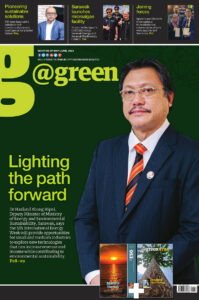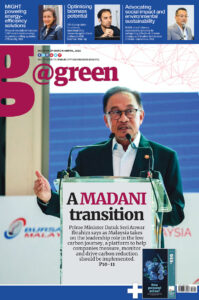Bias towards women development was from women themselves
 By Khirtini K Kumaran
By Khirtini K KumaranMalaysian Gas Association (MGA), in collaboration with Petronas Leading Women Network (PLWN), held the second edition of the MGA Industry Talk recently.
Focusing on the role of women in energy transition and the increasing blurring of lines between the oil & gas and the renewable energy sector, the ‘Conversation in D&I: Role of Women in Energy Transition’ live event drew the interest of more than 100 participation from MGA and PLWN.
The audience was welcomed by the emcee, Nabila Farhana Zainal Abidin from PLWN. It was followed by opening remarks from Hazli Sham Kassim, who represented both organisations as the President of MGA and the Lead, Signature Program 2 of PETRONAS Leading Women
Network (PLWN).
The event featured three distinguished women professionals in the energy sector: Dr Wei-nee Chen (Vice President, New Energy Ventures, Hibiscus Petroleum Berhad), Barbara Jinks (Programme Manager for Green Gas Delivery & Use, International Renewable Energy Agency) and Suhana Sidik (Head of Portfolio Management and Risk, New Energy, Petronas).
The session was moderated by Rosman Hamzah, the Secretary-General of MGA.
Discussions were filled with captivating stories showcasing the panellists’ unique experiences transcending between the oil & gas and the renewable energy sectors.
Among the topics discussed were:
• the D&I status, opportunities and challenges in both sectors;
• the blurring of the line between oil & gas and renewable energy provides opportunities for professionals to migrate or transverse between the two sectors;
• how the two sectors could learn from each other to improve D&I and increase women participation at all levels.
According to Suhana, while diversity ensured women joined and participated, inclusion was crucial to ensure women had a conducive environment and support to stay in the organisation and had equal opportunities for promotions.
She said: “Companies that commit themselves to a more D&I leadership are proven to be more successful. At PLWN, gender D&I is high on our agenda. It is important to acknowledge that gender D&I is imperative and helps businesses thrive and achieve competitive advantage.”
Wei-nee added: “We only have one earth, and we do not have planet B. And time is not on our side. What we lack in time, we make up by harnessing the immense talents of both women and men. We’ll get there. And when we do, we’ll know our transition has been just and inclusive.”
Barbara said gender balance was a keystone for greater sustainability and more inclusive energy development. The global energy transition allowed us to reshape how energy is produced and distributed to reach gender equality.
“IRENA will continue to promote the importance of the role of women across all areas of renewable energy.”
Following were the key takeaways from the lively one-hour conversation between the moderator and panellists:
• Both sectors offer a different unique experience on D&I. The synergy between the two sectors is vital to enable its work environment to keep pace with the energy transition and provide long-term employment opportunities.
• With more women professionals traversing between the two energy sectors, their unique strength provides opportunities for improvement to create the right D&I environment for women to thrive.
• Turning words into action, the whole industry ecosystem needs to empower greater D&I in both sectors to accelerate and advance the energy transition.
• The broad participation of women in all the energy sectors is needed for a thriving clean energy transition.
Similarly, gas & renewable energy complement each other in pursuit of the energy transition.
The conversation ended with the panellists sharing some advice for women in the energy industry.
Barbara urged women to follow their heart.
“If you want to do something, you do it. Pick an industry, the renewables or gas that needs to be fixed, and make it better. And if you fail, that’s fine, but you will probably succeed if you love what you’re doing.”
She also advised them to reach out and ask for help from other women that they admire. “I think most women would be happy to talk and help out.”
Wei-nee shared that women tend to miss out or forego an opportunity
because they feel they are not ready or skilled yet. Her advice to women was to take up the possibility that aligned with their passion, even if they only had some of the skills.
“Opportunities are hard to come by, so don’t miss out. Jump into that opportunity first. And after that, you work hard to deliver and make sure that you deliver.”
Suhana noted the most extensive critiques and bias towards women development were from women themselves.
“We need to start supporting each other as we are in the minority. Let’s support and push each other up rather than pulling people down.” — @green









